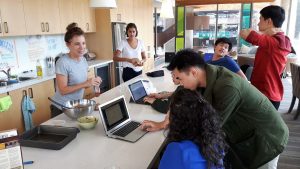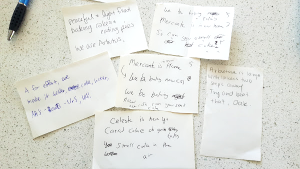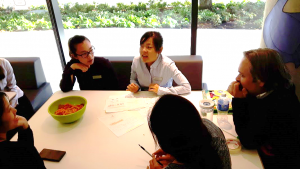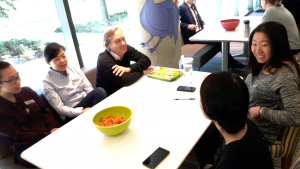First Edition of Neil’s Spiel
by Neil Armitage
It takes time for ideas to come together. I tend to blurt out ideas left, right and centre, sometimes without much thought to who is willing to listen. However, this is my thought process: the sharing and challenging of ideas is what I aim to invoke and what I look for in students – be it in class, student assignments, or casual conversation. Neil’s Spiel is in this vein, a place to bounce and buffer my thoughts and ideas on learning and the student experience. Thanks for listening and critique welcome.
My thoughts and ideas this term have focused on how to develop a culture whereby first year students become self-directed and resourceful from the off-go at UBC. How can we steer students to take greater responsibility for and direct their own learning and development both inside and outside the classroom? As such, how as staff may we take a back seat and provide direction when called upon?
Next term in my first year Sociology class (SOCI 102 – Social Inequality & Change), aside of the normal large lectures, I have decided to abandon the traditional discussion group format to try something different. Instead of asking students to read assigned material prior to the discussion group, they will be tasked with completing three assessed activities across the term. This change comes in response to years of seeing students not coming prepared to debate assigned material, defeating the purpose of discussion groups. While I still dream of students engaging in lively academic debate, I have found this dream slipping further away year by year.
Since starting teaching in post-secondary education back in 2008 I have seen a progressive decline in student reading. As someone who was a conscientious student and recalls the satisfaction of engaging with new ideas and the sense of achievement when completing challenging books, it is a difficult dream to give up on. But if you can’t beat ’em, (there are laws against that now) join ’em.
In an effort to activate students, the discussion group activities for SOCI 102 are designed to make Sociology relevant to their lives, and get students to engage purposefully with their peers, work collaboratively, and build community. Drawing on the theme of ‘Build My Career’ the onus is placed on the students to work together in the allotted discussion group time – from exploring their social location and support, co-curricular opportunities on campus, to the range of occupations Sociologists occupy.
I now turn my attention to outside of the classroom to some of our work in the CSI&C. Take the theme of ‘Build My Career’. As the FYE team recently noted, many student resumes boast a plethora of experiences. However, more often than not resumes were unreliable signifiers of candidate quality. There appears a bias towards quantity rather than quality of experiences on student resumes. So how may we start to promote a culture whereby students think more qualitatively about building their skills and career?
When applying for a position one must fulfil certain criteria, skills, knowledge and qualifications. Why could this not be the case in student leadership and engagement? On April 1st 2017 some of us will be running community building sessions in Spring Welcome, where over 1000 students will literally be filtered through Brock Hall. A few days before I will try to recall what I did the last time I ran the sessions, what worked, what was more difficult, etc. While I appreciate this mass training event emerged from a quick need to ensure student leaders could duly fulfil their roles in the community, arguably the current format does not promote self-directed learning. Would it be possible to create a sustainable model that mirrors the kind of experience students and graduates will face in their future careers, taking responsibility for their professional development? I suggest it is.
Instead of recruitment before training, let’s place the onus on the student to sign up and register for community building training prior to being legible to apply for student leader positions. Training before recruitment – where training is provided on a semi-regular basis from professional staff at appropriate times and locations. This would again ensure that applicants are able to fulfill their role, and guarantee that community building training is continually developing and fulfilling current community needs. This flipped approach I argue would encourage students to actively take responsibility for their own learning and professional development. More importantly, just think of all the time saved reading applications.
Holiday Reading
by Nick Thornton
Every holiday season I set the same goal: read a book. Just one. I read a lot at work and at home but it’s quite rare that I sit down with one book and read it from start to finish. What usually ends up happening is I take 5-6 books with me, haul them across the country, and then spend my time at the in-law’s doing everything from cleaning out the garage to arranging cheese-plates (oh, the irony) but certainly not reading. So this is my year. I’m determined to narrow down my list to one book that will be my holiday read. Here’s my shortlist:
1. Dreamland: The True Tale of America’s Opiate Epidemic by Sam Quinones – Not a holiday story by any stretch of the imagination but a pertinent topic given the unfolding political and social situation with our neighbor’s to the South. A recent study suggested that as many as 70% of prescription opiate users end up addicted (with obviously fluctuating scenarios within that). Certainly universities are not immune to this. Anyway, I don’t own this book yet but it’s number 1 on the list. Perhaps something lighter?
2. El futuro de Cuba después Fidel (The Future of Cuba After Fidel)- Fidel Castro Ruz, Felipe Perez Roque, Heinz Dietrich- Maybe not a classic holiday yarn either but given the recent passing of Fidel Castro and the fact that my grad school proposal is due January 7th, I’m interested to see how Castro envisioned Cuba following his death. Extrapolating a little, theories around the future and imagined societies figure prominently in educational theory and frameworks and that is precisely why I’m choosing Cuba as my area of interest.
3. Martin Chuzzlewit- Charles Dickens- Finally, something a little closer to the holiday spirit. Nothing says holidays with family like a Dickensian tale of conniving and distant relatives after the most promising member of the family. The bonus of this book is that I’ve already started and Dickens is so lugubrious in his descriptions that I remember exactly where I left off.
Maybe not to everyone’s taste so let me know what’s on your holiday reading list!
Highlighted Resource/Story
Here’s the Ubyssey’s article ‘Q+A with Someone Who Studies Studying’




